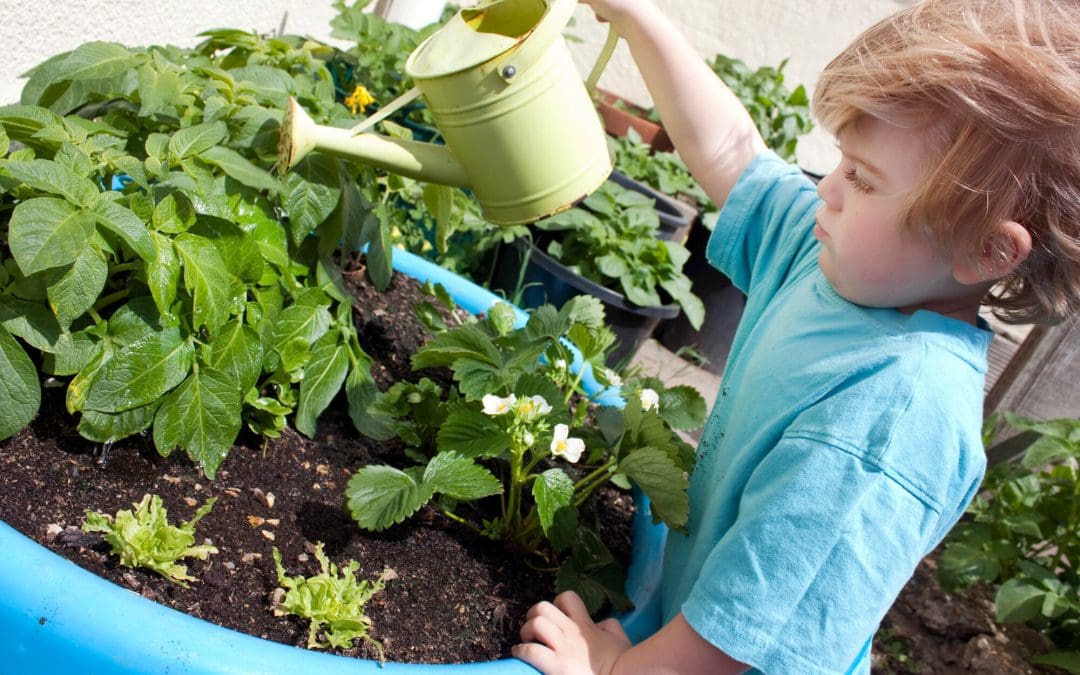Gardening with children can be a rewarding and educational experience for the whole family. Not only does it provide an opportunity to spend quality time outdoors, but it also teaches children valuable lessons about nature, responsibility, and patience. Engaging kids in gardening activities can spark their curiosity, creativity, and appreciation for the environment. Here are some tips to make gardening with kids a fun and enriching experience.
1. Start Small When Gardening With Kids
Begin with simple and manageable gardening projects that align with your child’s age and attention span. Start with a small plot or container garden where they can see quick results. Plants like sunflowers, cherry tomatoes, or herbs are great choices for beginners.
2. Create a Kid-Friendly Space
Designate a specific area in your garden or yard for your children to call their own. Let them personalize it with colorful decorations, fun signs, or their own hand-painted plant markers. Having their own space will give them a sense of ownership and pride in their gardening endeavors.
3. Choose Child-Friendly Plants
Select plants that are easy to grow and maintain, and that will capture your child’s interest. Brightly colored flowers, fast-growing vegetables like lettuce or radishes, or fragrant herbs like mint or lavender are all excellent choices. Consider including plants that attract butterflies or hummingbirds to add an extra element of wonder to the garden.
4. Make Gardening with Kids Hands-On
Encourage your children to get their hands dirty by involving them in every step of the gardening process, from planting seeds to watering and weeding. Let them explore the soil, dig holes, and plant seeds using child-sized tools. Getting physically involved in the garden will help them develop important motor skills and a deeper connection to nature.
5. Teach Them About the Environment
Use gardening as a platform to teach children about the natural world and the importance of environmental stewardship. Discuss concepts like soil health, water conservation, and the role of pollinators in the garden ecosystem. Show them how composting kitchen scraps can enrich the soil and reduce waste. Take nature walks to observe insects, birds, and other wildlife in their natural habitats, and explain how they contribute to a healthy garden environment.
6. Make Learning Fun
Incorporate educational activities and games into your gardening routine to keep children engaged and excited about learning. Create scavenger hunts to search for different types of plants or insects in the garden. Use gardening books, videos, or online resources to learn about plant life cycles, photosynthesis, and other scientific concepts in an accessible way.
7. Encourage Experimentation
Encourage your children to experiment and take risks in the garden. Let them try different planting techniques, explore new varieties of plants, or conduct simple experiments like growing plants in different types of soil or light conditions. Emphasize the importance of learning from both success and failure, and celebrate the joy of discovery along the way.
8. Foster a Sense of Responsibility When Gardening with Kids
Assign age-appropriate gardening tasks to your children and emphasize the importance of taking care of living things. Teach them how to water plants regularly, pull weeds, and protect them from pests and diseases. Instilling a sense of responsibility for the garden will help children develop important life skills like patience, perseverance, and empathy.
9. Celebrate Harvest Time
Make harvesting and enjoying the fruits of their labor a special occasion for your children. Encourage them to taste the vegetables and herbs they’ve grown and use them in simple recipes like salads or smoothies. Plan a “harvest festival” where they can showcase their produce to family and friends, or even donate surplus crops to a local food pantry or community garden.
10. Lead by Example While Gardening with Kids
Above all, be a role model for your children by demonstrating your own love and respect for nature and the environment. Involve them in your own gardening activities and share your enthusiasm for plants, wildlife, and the outdoors. By nurturing your own passion for gardening, you’ll inspire your children to develop their own green thumbs and cultivate a lifelong love of nature.
Gardening with kids is not just about growing plants—it’s about nurturing curiosity, fostering creativity, and cultivating a deeper connection to the natural world. By following these tips and embracing the joy and wonder of gardening together, you’ll create cherished memories and sow the seeds for a lifelong appreciation of nature in your children.
Home Gardening FAQs
How can I attract beneficial insects to my garden?
Planting a diverse range of flowering plants, providing shelter such as rock piles or bee houses, and avoiding the use of pesticides can help attract beneficial insects like bees, ladybugs, and lacewings.
What tools do I need to start gardening at home?
Essential tools for home gardening include a trowel, garden gloves, watering can or hose, pruning shears, and a hand cultivator. Optional tools may include a shovel, rake, and wheelbarrow.
How can I start a garden if I have limited space, such as a small balcony?
Even with limited space, you can garden effectively using containers, vertical gardening techniques, and choosing compact or dwarf varieties of plants. Herbs, salad greens, and certain vegetables can thrive in small spaces with proper care.
How often should I water my plants?
The frequency of watering depends on factors such as plant type, weather conditions, and soil moisture levels. As a general rule, water deeply and infrequently, allowing the soil to dry out slightly between watering sessions.
What are some common pests and diseases that affect home gardens?
Common pests include aphids, caterpillars, and snails, while diseases like powdery mildew and fungal leaf spots can also affect plants. Regular inspection and proper cultural practices can help prevent and manage these issues.
Home Inspection Protection provides professional inspections in Naples, Florida, and the surrounding area. Contact us today to schedule our services and gain peace of mind for your property transaction.

